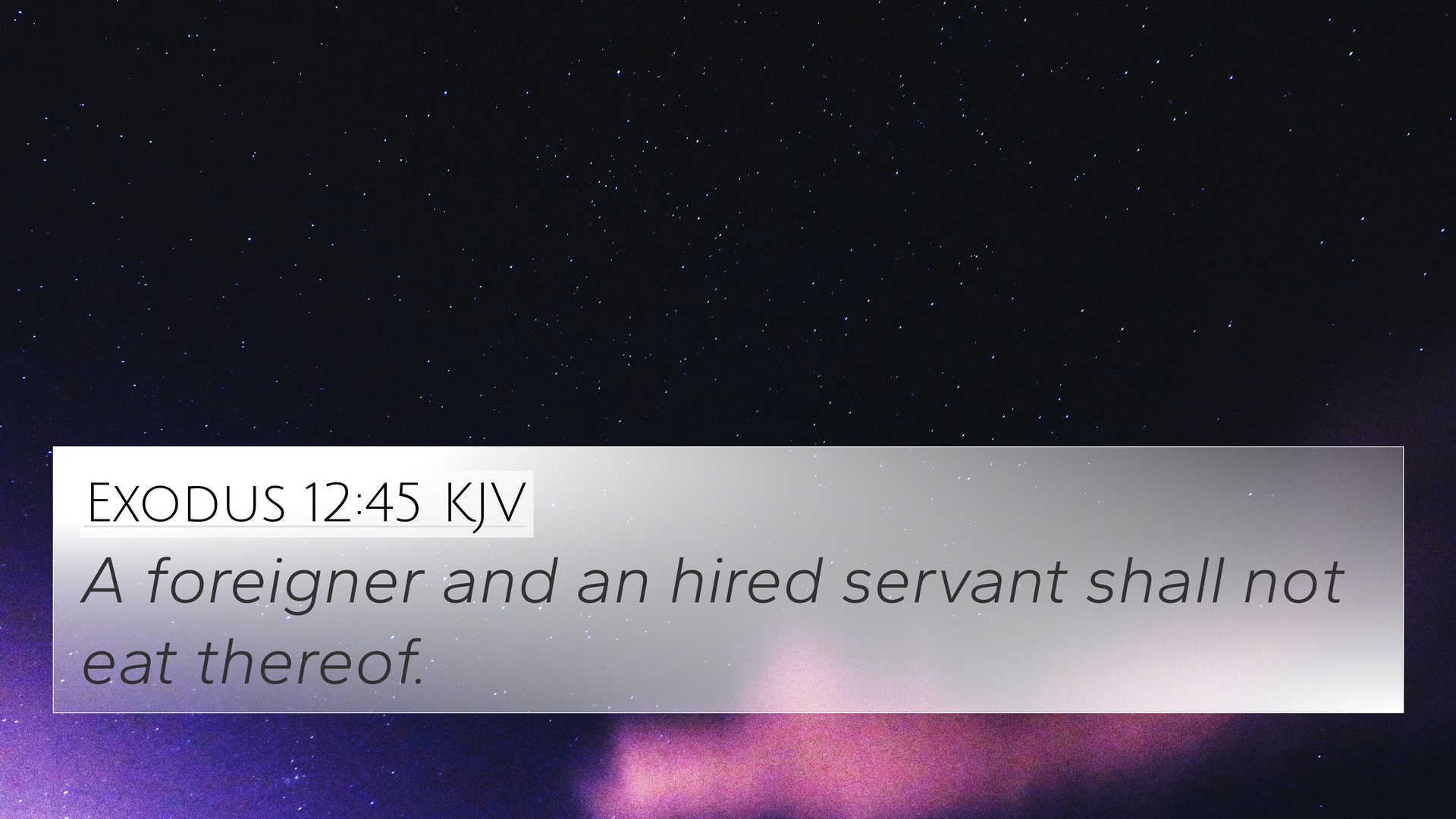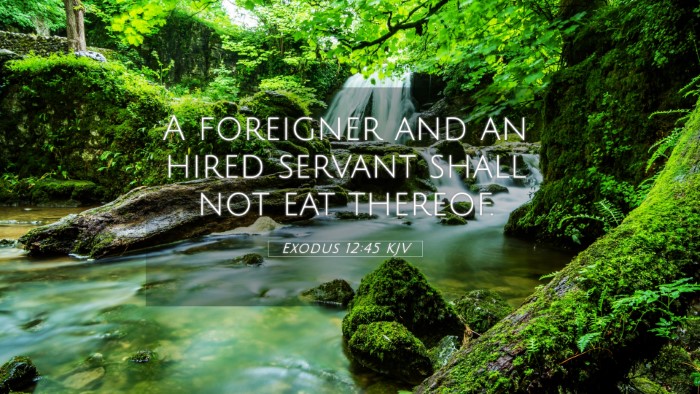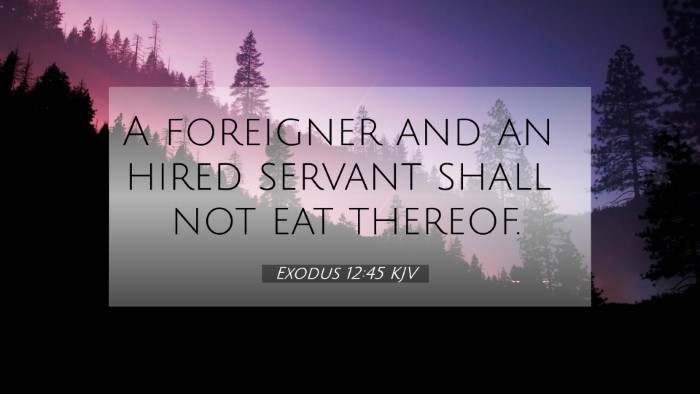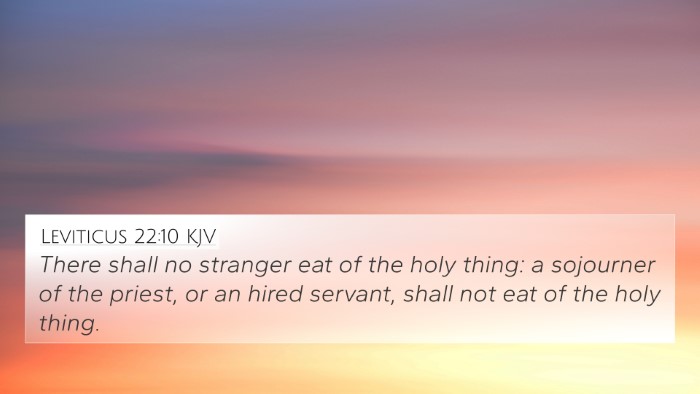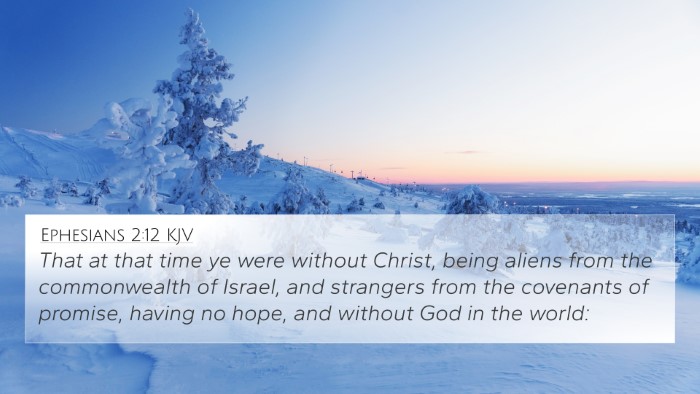Understanding Exodus 12:45
Exodus 12:45 states: "A foreigner and a hired servant shall not eat of it." This verse is set within the context of the instructions given to the Israelites regarding the Passover lamb, emphasizing the significance of belonging to the covenant community for participation in this sacred meal.
The commentary on this verse from various biblical scholars provides insights into its meaning and implications:
Summary of Insights
-
Matthew Henry: Henry notes that the exclusion of foreigners and hired servants from eating the Passover lamb underscores the importance of covenantal identity. Only those who were part of the Israelite community, representing God’s chosen people, were allowed to partake in this sacramental meal. This restriction highlights God's plan of salvation, which is always extended to His covenant community.
-
Albert Barnes: Barnes emphasizes that this verse illustrates the conditions under which the Passover may be observed. The Passover was intended for the families of Israel, indicating that true participation requires an acknowledgment and acceptance of God's covenant. This principle of involvement within a specific community suggests the need for relational transparency and commitment to God's purposes.
-
Adam Clarke: Clarke elaborates on the implications of the word 'foreigner.' He explains that it is not merely about nationality but denotes those who are outside the covenant of God. Clarke adds that the meal signifies a deeper spiritual truth—only those who have a relationship with God through faith can partake in the blessings He promises, symbolized by the Passover feast.
Key Themes and Cross-References
The underlying theme in Exodus 12:45 connects to broader theological concepts concerning covenant, inclusion, and the nature of God’s community. Below are related Bible verses that provide deeper insights:
- Ezekiel 44:9: This verse similarly emphasizes the requirement of being part of God’s chosen people to participate in sacred rites, reinforcing the notion of covenant exclusivity.
- Matthew 26:29: In the New Testament, Jesus mentions that He will drink the fruit of the vine with His disciples in His Father’s kingdom, illustrating the shift towards inclusivity for believers.
- Luke 22:15-16: Here, Jesus specifies that He eagerly desired to celebrate the Passover with His disciples, highlighting the new covenant's extension beyond Israel.
- 1 Corinthians 5:7-8: Paul speaks of Christ as our Passover lamb, emphasizing the new covenant and the spiritual application of the Passover feast for believers.
- Hebrews 9:22: This verse reiterates the necessity of blood for forgiveness, anchoring the significance of the Passover in the sacrificial system.
- Galatians 3:26-29: These verses highlight the inclusivity of faith in Christ, showing that all believers, regardless of ethnic or social boundaries, become part of God's family.
- Colossians 2:16-17: Paul refers to the feasts and festivals as shadows of Christ, demonstrating that the Passover pointed to the ultimate fulfillment in Christ.
Thematic Connections
Exodus 12:45 creates a rich dialogue on the themes of exclusion and inclusion within the community of faith. It provides a strong foundation for understanding how God’s covenant allows for participation based not only on heritage but on faithfulness and relationship with Him. This verse calls us to reflect on who is invited into God’s presence and how we engage with those who may be on the periphery of faith communities.
Using Cross-References for Deeper Understanding
Tools for Cross-Referencing: Engaging with biblical cross-references, such as using a Bible concordance or a cross-reference guide, can deepen our understanding of scriptural connections. By exploring these resources, you can:
- Identifying connections between Old and New Testament themes.
- Engaging in a comparative study of Pauline epistles.
- Exploring links between the Prophets and Apostolic teachings.
- Interpreting Biblical themes through thorough investigation of cross-references.
Conclusion
Exodus 12:45 serves not just as a historical account of the Passover, but as a timeless reminder of the nature of God's covenant and the significance of community in worship. Understanding the passage through public domain commentaries allows us to see the depth of Biblical texts and their interconnectedness, inviting us into a broader narrative of salvation history and the principles of faith.
